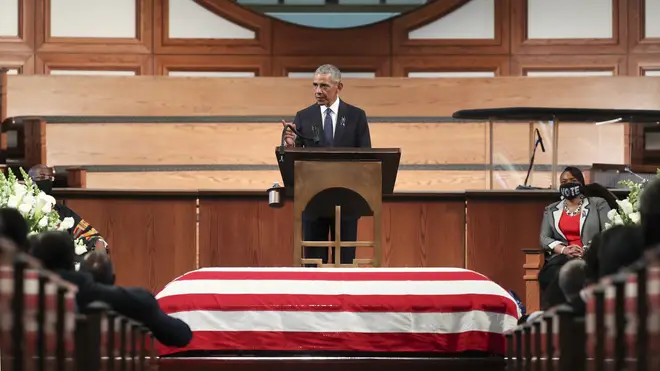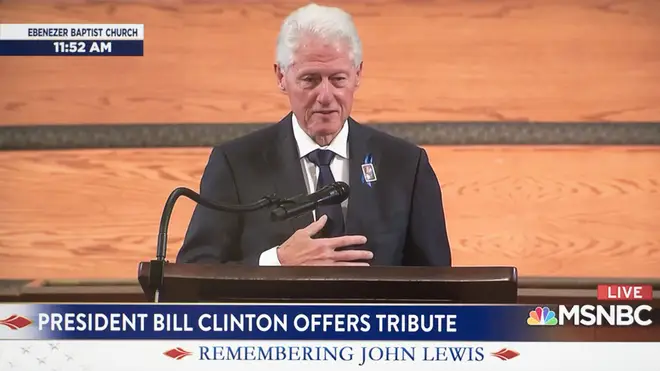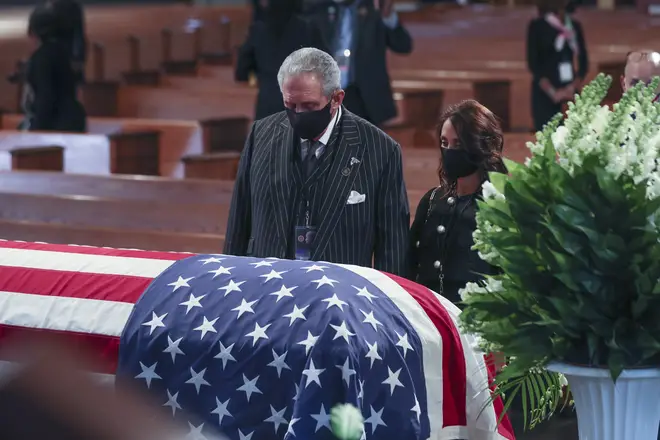
Paul Brand 10am - 12pm
30 July 2020, 20:11

Former US President Barack Obama has advocated for voting reform whilst delivering a powerful eulogy at the funeral of the US congressman and civil rights leader John Lewis.
Lewis died on July 17 at the age of 80, and has been mourned, revered and celebrated at the church where Martin Luther King Jr used to be pastor in Atlanta, Georgia.
Three former presidents joined in the eulogies after nearly a week of mourning that took him from his birthplace in Alabama to the nation's capital of Washington to his final resting place in his home of Atlanta.Barack Obama attended the funeral at Ebenezer Baptist Church, a sacred place for many of those who helped to shape US civil rights history, and was expected to address mourners.
Bill Clinton and George W Bush and former first lady Laura Bush were also in the church.
Mr Lewis was "a man of pure joy and unbreakable perseverance", former president Barack Obama said during a fiery speech in which he hearkened back to Mr Lewis' legacy and connected it to the ongoing fight against those who are "doing their darndest to discourage people from voting".
"He as much as anyone in our history brought this country a little bit closer to our highest ideals," Mr Obama said.
"And some day when we do finish that long journey towards freedom, when we do form a more perfect union, whether it's years from now or decades or even if it takes another two centuries, John Lewis will be a founding father of that fuller, fairer, better America."
"If politicians want to honor John," former Pres. Barack Obama says, "there's a better way than a statement calling him a hero."
— The View (@TheView) July 30, 2020
"Let's honor him by revitalizing the law that he was willing to die for." https://t.co/FJ91nhDL1m pic.twitter.com/K1WKbISa2B
The former president delivered a eulogy at the funeral, in which he said John Lewis "knew that every single one of us has a God-given power and that the fate of this democracy depends on how we use it."
"I have come here today because, like so many Americans, I owe a great debt to John Lewis and his forceful vision of freedom," he said.
"Now this country is a constant work in progress. We're born with instructions to form a more perfect union.
"Explicit in those words is the idea that we are imperfect, that what gives each new generation purpose, is to take up the unfinished work of the last, and carry it further than any might have thought possible.
"John Lewis, first of the freedom writers, head of the student non-violent coordinating committee, the youngest speaker at the march on Washington, leader of the march from Selma to Montgomery, member of congress representing the people of this state and this district for 33 years, mentor to young people including me at the time until his final day on this earth.
"He not only embraces that responsibility, but he made it his life's work."
He continued: "If politicians want to honour John, there is a better way than a statement calling him a hero. You want to honour John, let's honour him by revitalising the law he was willing to die for.
Obama also called for action to ensure "every American is automatically registered to vote, including former inmates, adding polling places and expanding early voting, and making Election Day a national holiday."
JUST IN: Former Pres. Obama calls for action to ensure "every American is automatically registered to vote, including former inmates...adding polling places and expanding early voting, and making Election Day a national holiday." https://t.co/FJ91nhDL1m pic.twitter.com/KRm3OJXua7
— The View (@TheView) July 30, 2020
Former President George W Bush had mourners laughing as he recounted Lewis' first non-violent protest of refusing to eat his own "flock" of chickens, who he baptised, married and preached to.
"Every morning he would rise before the sun to attend the flock of chickens. He love those chickens," Mr Bush said.
"He's been called an American saint, a believer willing to give up everything. Even life itself to bear witness to the truth that drove him all his life. That we could build a world of peace and justice and harmony and love."
Another former President, Bill Clinton, said: "I think it's important that all of us who love him remember that he was after all, a human being. A man like all other humans born with strengths that he made the most of when many don't."
"Born with weaknesses that he worked hard to beat down when many can't. But still a person. It made him more interesting, and it made him in my mind even greater."
Speaker of the House, Nancy Pelosi, held back tears and she remembered the night Mr Lewis died.
"When John Lewis served with us he wanted us to see the civil rights movement and the rest through his eyes. He told us so many stories, he taught us so much and he took us to Selma," she said.
"He wanted us to see how important it was to understand the spirit of non-violence.
"We waved goodbye when he started to leave us. He was telling us. He was telling us. I'm home in heaven. I'm home in heaven. We always he knew he was on the side of the angels and now he's with them."

"Here lies a true American patriot who risked his life for the hope and promise of democracy," Ebenezer's senior pastor, the Rev Raphael Warnock, told the congregation as the funeral began.
One of Mr King's daughters, the Rev Bernice King, led the congregation in prayer: "We will continue to get into good trouble as long as you grant us the breath to do so," she said.
Outside the church, hundreds gathered to watch the service on a large screen. Some sang the gospel song We Shall Overcome.
When Mr Lewis was 15, he heard Mr King's sermons on WRMA, a radio station in Montgomery, Alabama, he recalled in an interview for the Southern Oral History Programme.
"Later I saw him on many occasions in Nashville while I was in school between 1958 and '61," Mr Lewis said. "In a sense, he was my leader."
Mr King was "the person who, more than any other, continued to influence my life, who made me who I was," Mr Lewis wrote in his 1998 autobiography, Walking With The Wind.
By the summer of 1963, Mr Lewis was addressing thousands of people during the March on Washington, speaking shortly before Mr King gave his "I Have a Dream" speech. He spoke then about black people beaten by police and jailed - themes that resonate vividly in today's times.
In 1965, Lewis was beaten by Alabama state troopers in the city of Selma in what became known as "Bloody Sunday".

Last Sunday, his coffin was carried across the Edmund Pettus Bridge in Selma. The wagon rolled over a carpet of rose petals on the bridge that spans the Alabama River. On the south side of the bridge, where Mr Lewis was attacked by the police officers, family members placed red roses that the carriage rolled over, marking the spot where Mr Lewis spilled his blood and suffered a head injury.
Mr Lewis was later awarded the Medal of Freedom by the nation's first black president in 2011.
He spent more than three decades in Congress, and his district included most of Atlanta.
Shortly before he died, Mr Lewis wrote an essay for The New York Times and asked that it be published on the day of his funeral. In the piece published, he recalled the teachings of Mr King.
"He said we are all complicit when we tolerate injustice," Mr Lewis wrote. "He said it is not enough to say it will get better by and by. He said each of us has a moral obligation to stand up, speak up and speak out."
"Though I may not be here with you, I urge you to answer the highest calling of your heart and stand up for what you truly believe," Mr Lewis added.
"In my life I have done all I can to demonstrate that the way of peace, the way of love and nonviolence is the more excellent way. Now it is your turn to let freedom ring."